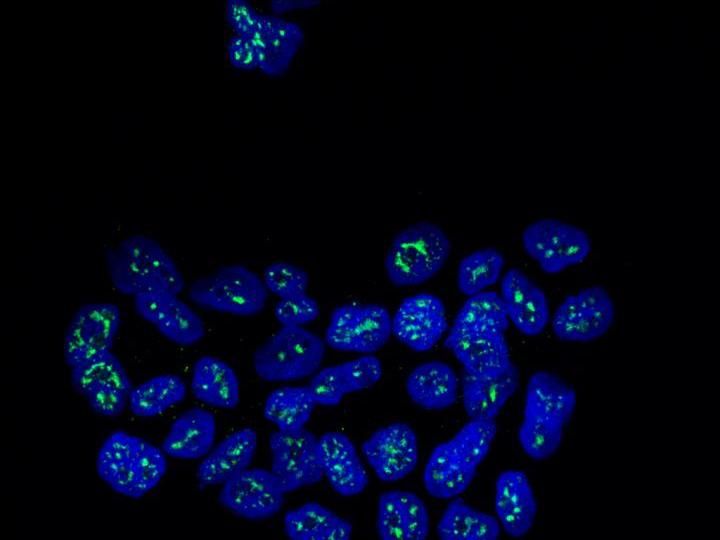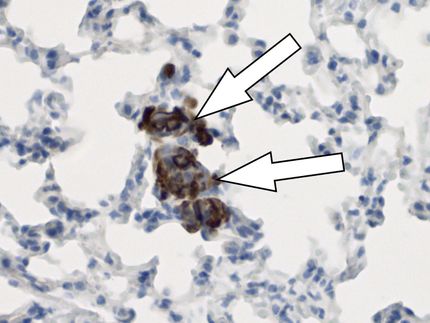A protein that keeps metastatic breast cancer cells dormant
The time needed for breast cancer metastases (secondary lesions caused by cells that have escaped from the original tumour) to develop varies between patients, and little is known about the mechanisms that govern latency (the dormant state of cells that have already spread through the body). A study headed by ICREA researcher Roger Gomis at the Institute for Research in biomedicine (IRB Barcelona) has identified the genes involved in the latent asymptomatic state of breast cancer metastases. The work sheds light on the molecular basis underlying how the expression of certain genes facilitates the spread of metastatic lesions.

Nuclei of metastatic breast cancer cells showing the protein MSK1 in green.
Cristina Figueras-Puig, IRB Barcelona
The team has studied the most common kind of breast tumour--estrogen-positive (ER +) and accounting for 80% of breast cancer tumour cases--that is characterised by a long period of latency with no symptoms.
MSK1, the protein that keeps tumour cells dormant
The team has identified the protein kinase MSK1 as a key regulator of dormant or latent metastases. Using clinical samples from patients, the scientists have confirmed that ER + breast cancer tumours that do not express MSK1 are associated with a risk of earlier relapse, while those that express this molecule will form metastases later.
"We are interested in understanding the mechanisms underlying metastasis and the time component of this process. Until now, little was known in preclinical models about the mechanisms that allow breast cancer cells to leave the latent state and even less is known in patients," explains Roger Gomis, head of the Growth Control and Cancer Metastasis Lab.
The researchers believe that in the future this discovery may benefit patients in two ways. Firstly, it will help to identify those with an imminent risk of relapse and to adjust the treatment for this prognosis. Secondly, attempts could be made to design a treatment to mimic the function of MSK1 kinase, with the aim to maintain metastatic lesions in a latent and asymptomatic state for as long as possible.
Original publication
Sylwia Gawrzak et al.; "MSK1 regulates luminal cell differentiation and metastatic dormancy in ER+ breast cancer"; Nature Cell Biology; 2018
Most read news
Original publication
Sylwia Gawrzak et al.; "MSK1 regulates luminal cell differentiation and metastatic dormancy in ER+ breast cancer"; Nature Cell Biology; 2018
Topics
Organizations
Other news from the department science

Get the life science industry in your inbox
By submitting this form you agree that LUMITOS AG will send you the newsletter(s) selected above by email. Your data will not be passed on to third parties. Your data will be stored and processed in accordance with our data protection regulations. LUMITOS may contact you by email for the purpose of advertising or market and opinion surveys. You can revoke your consent at any time without giving reasons to LUMITOS AG, Ernst-Augustin-Str. 2, 12489 Berlin, Germany or by e-mail at revoke@lumitos.com with effect for the future. In addition, each email contains a link to unsubscribe from the corresponding newsletter.





















































